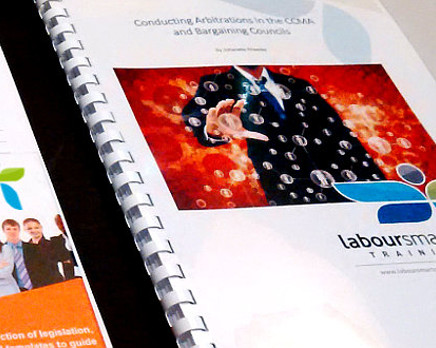- Course Name
- C17 - Conducting Conciliations & Arbitrations in the CCMA
- Course Description
- All employers are taken to the CCMA at one stage or another. Many cases have been lost by employers and employees, union representatives or even attorneys because the case has not been presented properly. The CCMA is a creature of statute and the practitioner needs a sound knowledge of how a conciliation and arbitration process in the CCMA and bargaining councils work to achieve optimum success.
- Duration
- 3 days
- Cost
- R6 950.00
Module 1 : Introduction
• What is the CCMA?
• The Labour Court and Labour Appeal Court
• The ILO
• Bargaining Councils
Module 2 : Relevant sections of the LRA
• Defining the employment relationship
• Rights and mutual interest disputes
• Unfair dismissal and unfair labour practices
• Code of conduct on dismissal
• Disputes to be referred to the CCMA and Labour Court
• Disputes to be referred to arbitration
• Limitation on compensation
Module 3 : Dispute procedures and path in terms of the LRA
• Referral of disputes
• Conciliations
• Con-arb in terms of section 191(5)A
• Certificate of outcome
• Request for arbitration
• Arbitration and the LRA
• Pre dismissal arbitration
Module 4 : CCMA rules and forms
• Applications – rule 31
• Application for condonation – rule 12
• Serving and filing of documents
• Calculation of time periods
• Subpoenas and witness fees
• Objections to the same commissioner and
• Application for a senior commissioner
• Joining and substituting parties
• Taxation
• Objections to jurisdictions
• Representation and appearance during proceedings
• Settlement at conciliations or arbitrations
• Effect of arbitrations award
• Applications to certify award
• Postponements
• Applications for costs, cost orders and taxation
• Disclosure of information
Module 5 : Private arbitrations
Module 6 : Arbitration: preparation and presentation
• Attending conciliation
• Settlement during conciliation and arbitration
• Preparation for arbitration
• Planning the case
• Consultations
• Collecting evidence – sources of evidence
• Preparing witnesses
• Bundles of evidence
• Pre arbitration conference
• Applications and points in limine
Module 7 : Evidence on procedural and substantive fairness
• Disciplinary procedure
• Bias of the chairperson
• Suspension
Module 8 : Presenting or defending your case
• The role players
• Opening and closing statements
• Evidentiary burden
• Absolution of the instance
• Different types of evidence and how to present it
• Written statements and affidavits
• Probative material – different types, admissibility, relevance and weight
• Leading, cross examining witnesses
• Presenting and evaluating evidence
• Postponements and part heard matters
• Specific evidence: hearsay evidence
• Polygraph testing, alcohol and drug tests,
• Traps, confessions, admissions,
• Direct and circumstantial evidence, privileged evidence, expert evidence, opinion evidence, similar fact evidence, character evidence
Module 9 : Reviews
• Review requirements post Sidumo
Module 10 : Rescission
• When to apply and requirements
Module 11 : Examples and exercises
Module 12 : Practical role play
2025 © LabourSmart Training (Pty) Ltd. All Rights Reserved. | Developed and Hosted by Resolve Technology Solutions (Pty) Ltd | SEO by NextG



